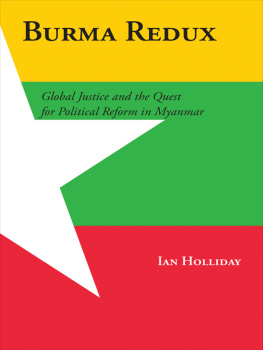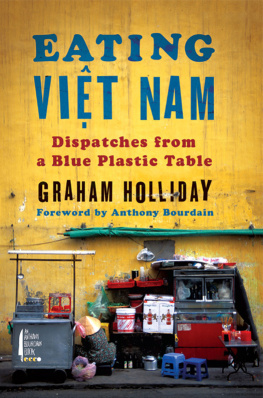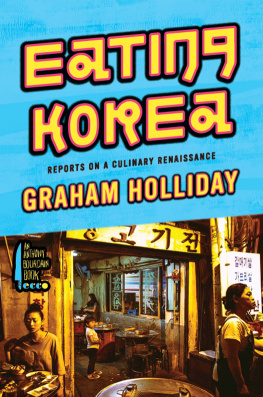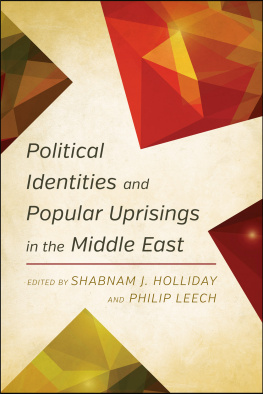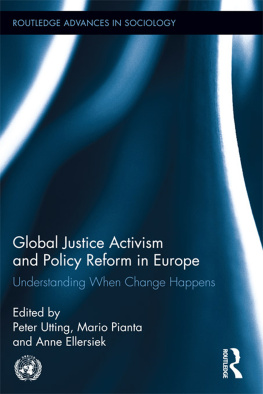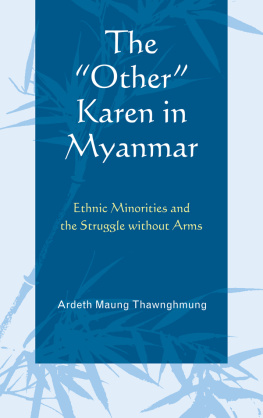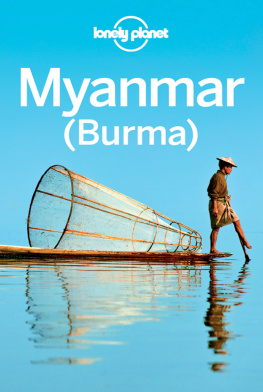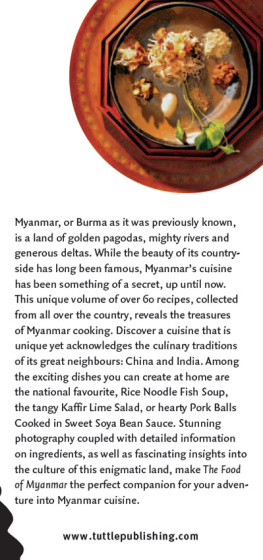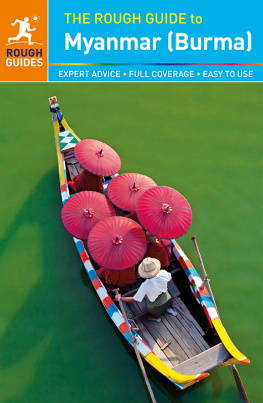Burma Redux
Burma Redux
Global Justice and the Quest for Political Reform in Myanmar
Ian Holliday
Columbia University Press
New York
Columbia University Press
Publishers Since 1893
New York Chichester, West Sussex
cup.columbia.edu
Copyright 2011 Hong Kong University Press
All rights reserved
E-ISBN 978-0-231-50424-9
Library of Congress Cataloging-in-Publication Data
Holliday, Ian.
Burma redux : global justice and the quest for political reform in Myanmar / Ian Holliday.
p. cm.
Includes bibliographical references and index.
ISBN 978-0-231-16126-8 (cloth : alk. paper)ISBN 978-0-231-16127-5 (paper : alk. paper)ISBN 978-0-231-50424-9 (ebook)
1. BurmaPolitics and government1948 2. BurmaForeign relations. 3. DemocracyBurma. 4. Human rightsBurma. I. Title.
DS530.4.H65 2011
959.1053dc23
2011034580
A Columbia University Press E-book.
CUP would be pleased to hear about your reading experience with this e-book at .
References to Internet Web sites (URLs) were accurate at the time of writing. Neither the author nor Columbia University Press is responsible for URLs that may have expired or changed since the manuscript was prepared.
Contents
This book was written toward the end of a five-year Deanship of Social Sciences at The University of Hong Kong. While that made for many early mornings and long weekends at the keyboard, it was also utterly dependent on a professional environment in which research could sometimes be combined with administration. For that, I am grateful to colleagues throughout the Faculty of Social Sciences, and particularly to the Faculty Office staff who interacted with me on a daily basis. Special thanks go to colleagues who worked alongside me throughout my Deanship: Amy Tsang, Vanessa Sit, Ann Lee, Eric Yeung, Simon Yung and Meimi Wong. I also pay tribute to Associate Deans and Heads of Department in the Faculty.
An initial airing of some of the books core themes took place in three lectures delivered at the 2006 Southeast Asian Studies Summer Institute at the University of Wisconsin-Madison. For feedback and comradeship I am especially grateful to students in U Saw Tuns Burmese language class who kept in touch after we all returned to normal life: Teri Allendorf, Heather MacLachlan, Jayde Lin Roberts and Matthew Walton. I also thank participants in the Myanmar symposiums I have organized annually since 2007. Konrad-Adenauer-Stiftung has been a consistently generous sponsor. Li Chenyang, my co-host for the past three years, has been a willing collaborator.
The very great collegiality of many Myanmar watchers in academia and beyond has always been a major source of stimulation and encouragement. I trust that most of my intellectual debts are clear from materials cited in the text. Informal conversations with diplomats, educators, aid agency workers and business people operating on the ground inside Myanmar or along its lengthy borders have also been tremendously helpful.
My enthusiasm for all things Burmese has been fuelled by many people, but perhaps above all by the colleagues and students who in summer 2008 helped launch the Facultys MOEI program of intensive English-language teaching in Mae Sot, Thailand. Glenn Shive and Daniel Siegfried played important early roles, and the late Hugh Cory was a truly inspirational trainer. Serena Yang provided essential financial support for an untried and untested initiative. Critically, the first cohort of teachers was exceptional and generated many stalwarts of later programs: Anushri Alva, Carl Browne, Ray Chan, Steve Gomersall, Grace Ip, Winnie Kwan, Diana Parker, Priscilla Sham, Peggy Wong and April Yeung. Sincere thanks to everyone.
From Myanmar friends, acquaintances and strangers both inside the country and in the diaspora I have learned more than they or I know. It has always been a great pleasure and privilege to talk, and I am enormously appreciative of the time and trust accorded to me. I am especially thankful to recent generations of Myanmar students at The University of Hong Kong. The fact that I do not name names here in no way diminishes my gratitude. I hope that through this book I can give something back.
Several colleagues read some or all of the draft manuscript and in each case provided valuable comments that undoubtedly made for a better book. Very great thanks indeed to Daniel Bell, Romain Caillaud, Ian Carter, Roman David, David Skidmore, David Steinberg, Derek Tonkin, Paul Wilding, Garrath Williams and two anonymous readers approached by the publisher. The usual disclaimer applies.
At Columbia University Press, I am grateful to Anne Routon and Brad Hebel for their enthusiastic and timely support of this project. At the originating publisher, Hong Kong University Press, I thank Michael Duckworth and Jennifer Flint.
For permission to draw on material previously carried elsewhere in developing several chapters, I thank the editors and publishers of the following journal articles: Ian Holliday, When Is a Cause Just?, Review of International Studies 28:3 (2002), 557-75 (Chapter 7); Ian Holliday, Ethics of Intervention: Just War Theory and the Challenge of the 21st Century, International Relations 17:2 (2003), 115-33 (Chapter 7); Ian Holliday, Doing Business with Rights Violating Regimes: Corporate Social Responsibility and Myanmars Military Junta, Journal of Business Ethics 61:4 (2005), 329-42 (Chapter 8) Roman David and Ian Holliday, Set the Junta Free: Pre-transitional Justice in Myanmars Democratization, Australian Journal of Political Science 41:1 (2006), 91-105 (Chapter 4); Ian Holliday, Voting and Violence in Myanmar: Nation Building for a Transition to Democracy, Asian Survey 48:6 (2008), 1038-58 (Chapter 4).
Last but by no means least, for belief and support across many years I thank Wesley Chan and Mary, Kathryn, Brian and Marjorie Holliday.
Ian Holliday
Hong Kong
April 2011
Myanmar names usually cannot be separated into a family name and given names. Other than in a small number of ethnic nationality languages, they function as an indivisible whole and are presented that way here.
Honorifics are still commonly used in Myanmar. In the dominant language, respect for successively older males is indicated by Maung, Ko and U. For successively older females, it is denoted by Ma and Daw. However, such titles are used as sparingly as possible here. Only major historical figures such as U Nu and U Thant are given honorifics, chiefly because they would be unrecognizable without them. Their actual names were Nu and Thant.
Myanmars currency is the kyat, which not only fluctuates in value against other currencies, but also has multiple official exchange rates. Broadly, US$1 = 1,000 kyats.
| ADB | Asian Development Bank |
| AFPFL | Anti-Fascist Peoples Freedom League |
| AI | Amnesty International |
| AIDS | acquired immune deficiency syndrome |
| ASEAN | Association of Southeast Asian Nations |
| BBC | British Broadcasting Corporation |
| BGF | Border Guard Force |
| BIA | Burma Independence Army |
| BNA | Burma National Army |
| BSPP | Burma Socialist Programme Party |
| CIA | Central Intelligence Agency |
| CPB | Communist Party of Burma |
| DSI | Defence Services Institute |
| DVB | Democratic Voice of Burma |
| EU | European Union |
| GDP | gross domestic product |
| HIV | human immunodeficiency virus |
|
Next page
